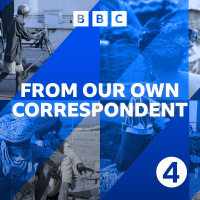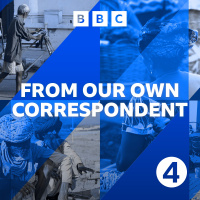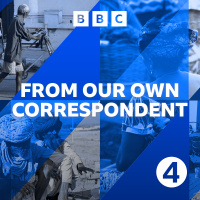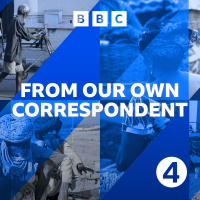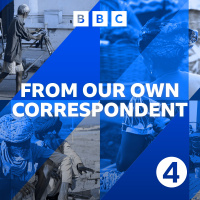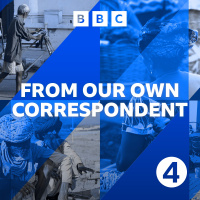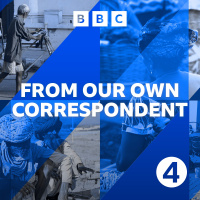Sinopse
Insight, wit and analysis as BBC correspondents, journalists and writers take a closer look at the stories behind the headlines. Presented by Kate Adie and Pascale Harter.
Episódios
-
May 21, 2010
21/05/2011 Duração: 27minThe carrots and sticks which the authorities in Saudi Arabia hope will persuade their people that protest is not a sensible option -- Michael Buchanan is gauging opinion in the desert kingdom. Who'll be the next president of Russia - Putin, Medvedev or someone else? It's a question preoccupying correspondents in Russia, among them the BBC's man Steve Rosenberg. As nuclear power plants around the world check their safety procedures after the apparent meltdown in Japan in March, Nick Thorpe visits a power station on the River Danube in Romania. The American president's on his way to Ireland but Kieran Cooke's been finding out that thousands of Irish, prompted by a tottering economy, are preparing to emigrate. And Kevin Connolly visits the casbah in Algers walking, he assures us, in the footsteps of Tarzan of the Apes.
-
May 14, 2011
14/05/2011 Duração: 28minAssisted suicide: as the people of Zurich in Switzerland prepare to vote on the issue, Imogen Foulkes tells a moving story about a couple who believed they had a right to decide on a date for death. Fergal Keane considers the historical significance of the forthcoming visit, by Queen Elizabeth 2, to the Republic of Ireland. Andrew Harding is in the Libyan rebel stronghold of Benghazi where, he says, people are determined to continue their fight against Colonel Gaddafi and to emerge with their country still united. Matthew Teller visits the city of Taif in Saudi Arabia, a place where many Saudi people spend their holidays while James Painter's in Peru asking questions about the freshwater Amazon dolphin including: why is it pink?
-
May 7, 2011
07/05/2011 Duração: 27minWeeks of violent confrontation in Uganda: Will Ross is in Kampala where lawyers are the latest group to protest against the regime of President Museveni. Mishal Husain is in the Pakistani town of Abottabad, where the life of Osama bin Laden, the world's most wanted man, was brought to an end last Sunday. Mishal talks of the new interest in this location which she remembers as a place her family went on holiday. President Obama was at Ground Zero this week and coincidentally, a little earlier, our correspondent Paul Adams was there with his two young sons who had awkward questions to ask about that day when the Twin Towers came crashing down. There's a new predator in the Caribbean -- the Lionfish. Tim Ecott's been to the Cayman Islands to get an idea of the scale of the problem it's brought with it. And Jonathan Fryer waits and waits for the night bus to Bolivia. But at least he has some company in the shape of a large, and affectionate, wild pig!
-
April 30, 2011
30/04/2011 Duração: 27minA very French murder story: Hugh Schofield tells how France has been transfixed by an appalling human drama -- the killing of a mother, three sons and a daughter. Owen Bennett Jones questions whether depicting the news from Syria as 'brutal suppression of peaceful protestors' might be, to some extent, misleading. A climate of fear is stifling discussion about Pakistan's controversial blasphemy laws -- that's the contention of the BBC's Jill McGivering who's been touring the country investigating. Richard Wilson makes a return trip to Antarctica and is shocked at how the continent's changing. Gareth Armstrong visits an Indian classroom and hears the students voice outrage at how the British regard the work of the children's author Enid Blyton.
-
April 23, 2011
23/04/2011 Duração: 28minStudents aren't revolting in Qatar and Oman -- Robin Lustig's been to the Gulf states to see what effect the uprisings in parts of the Arab world are having there. Justin Marozzi's in Libya as questions are being asked about who will run the country in the future. More journalists lost their lives this week in the fighting in Libya. Stuart Hughes reflects on the dangers a reporter can face covering conflict. Ethiopia is one of the least urbanised countries in the world; it's also a place which is losing its doctors - many of them are leave the country to work elsewhere. Claudia Hammond's been talking to some of the young people there who've now been charged with taking healthcare out into the wideopen spaces of the Ethiopian countryside. And why is it city dwellers in France are happy to live in apartments while their counterparts in the UK opt, where possible, for houses? Hugh Schofield in France wonders what this division tells us about the development of two neighbouring peoples.
-
April 16, 2011
16/04/2011 Duração: 27min'The Bahrain I had known wasn't there' - Frank Gardner, who used to live on the Gulf island, reports on life there under a state of emergency. The 7/7 bombings in London claimed victims of many nationalities; Nick Beake has travelled to Poland to hear more about one of them: a young woman who was a keen student and a member of the local choir. India's huge population has come under scrutiny in the recent census and Mark Tully has been wondering if the country's relatively youthful population will ultimately prove a boon for the economy -- or a drain on it. A long running strike at the Detroit Symphony Orchestra has finally come to an end and Petroc Trelawny's been hearing that it could be a long time before the wounds are healed. And Kathy Flower finds that chemists' shops in the French Pyrenees offer much more than just aspirins - they're places you can visit for advice on wild mushrooms: will they kill you or prove a tasty topping on your omelette?
-
April 09, 2011
09/04/2011 Duração: 27min'Even the winners are losers'-- Andrew Harding goes on a road journey through devastated, terrified Ivory Coast; Robert Hodierne on the homes being built for limbless former combat troops in the United States; Stephen Sackur's in the Australian outback hearing how the Chinese are getting iron ore there; the dangers of childbirth in Afghanistan and the efforts being made to improve the situation are explained by Nadene Ghouri in Kabul while Nick Thorpe hears tales about the ancient sturgeon and how it's facing extinction on the River Danube.
-
April 2, 2011
02/04/2011 Duração: 28minVisiting time at Yemen's jail for political prisoners: Genevieve Bicknell meets the families of some of those detained who tell her why they feel it's time for the country's president to step down. Mark Urban, just back from Afghanistan, talks of a new attempt to improve the tarnished image of Afghanistan's police force. How the Lost Boys, who fled the civil war in Sudan, are finding out details of their past thanks to an archive which had been gathering dust in Addis Ababa -- that's from Paul Adams. Linda Pressley travels deep into the forests of Ecuador to find out how oil exploration is threatening a way of life. Anu Anand is in Delhi where traditional story-tellers have been tempting people away from their flatscreen TVs. And Owen Bennett Jones is in Cairo wondering if he's just been ripped off by a canny taxi driver.
-
March 26, 2011
26/03/2011 Duração: 28minCrisis in the Eurozone -- Chris Morris in Brussels says we're ignoring it at our peril. Sue Lloyd Roberts hears two opinions about Saudi Arabia: do its women live pampered lives or are they kept prisoners? Nick Thorpe's in a village in eastern Hungary where vigilantes say Roma crime is raging out of control. Crazy names for serious people in the Philippines, Kate McGeown investigates. And Gabriel Gatehouse is in The Netherlands trying to ask the Royal Family if they still ride about on bicycles.
-
March 19, 2011
19/03/2011 Duração: 28minExplosions and gunfire in Benghazi -- Kevin Connolly on the struggle for power in eastern Libya; Rupert Wingfield Hayes is in Tokyo where there's growing fear at the prospect of nuclear meltdown. Hannah Barnes has been talking to lovers of Hebrew who are determined to ensure that the language remains as up to date as it can possibly be. Two months after a Congresswoman was shot in Tucson, Arizona, David Willis looks at the impact the incident had had on America's attitude towards guns. And Monhammed Hanif has been touched by the miseries of a splendid snow leopard which has been removed from its home among the craggy peaks of Pakistan.
-
March 17, 2011
17/03/2011 Duração: 28minColossal forces of nature have devastated Japan and the country faces the possibility of a nuclear disaster; but in the teeth of catastrophe Rachel Harvey discovers an extraordinary resilience on the part of the Japanese people. Egypt is undergoing massive political upheaval; and while the country is struggling to shape its future, Christine Finn hears that looters are increasingly plundering its past. Southern Sudan is just a few months away from independence; Hugh Sykes gets a feel for life in what will be Africa's newest capital city. On the anniversary of Italy's unification, David Willey meets the Italians who would rather dismantle the state than celebrate its foundation. And, enjoying a rare glimpse of Russia's pioneering spacecraft, Richard Hollingham wonders whether Russia might prove to be the real winner of the space race.
-
March 12, 2011
12/03/2011 Duração: 28minEarthquake in Japan: Hugh Levinson on how fear of catastrophe has helped shape the country's psyche; menace and bloodshed in Ivory Coast's largest city - Andrew Harding on the violence triggered by a dispute over the presidency. What impact has the foreign media had on the course of the uprisings in north Africa and the Middle East? It's a question confronted here by the BBC's World Affairs Editor John Simpson. In north-east India, Rupa Jha meets some of the women who've lost their husbands in a series of under-reported insurgencies and Martin Patience spends a morning being amazed at Mr Wu's robot factory in China.
-
Mar 10, 2011
10/03/2011 Duração: 28minMichael Buchanan goes behind the front lines in the rebel city of Benghazi in Libya and finds many are still giddy with delight at their new found freedom. John James has been watching the West African State of Ivory Coast descend into chaos over the bitterly disputed election. In Cuba, Polly Hope finds people are plunging into the once forbidden world of commerce with huge enthusiasm. Daniel Sandford gets to the heart of the matter in Ukraine, listening to the tales of a former government driver battling against corruption. And Jonny Hogg spends time with a group of musicians who are attempting to play their way out of poverty in the Democratic Republic of Congo.
-
March 5, 2011
05/03/2011 Duração: 28minDreams of a new Libya in the revolutionary city of Benghazi but, as Kevin Connolly's been discovering, there's fear too. Could Saudi Arabia be touched by this season of revolt in the Middle East? It's a question answered by a correspondent who knows the kingdom better than most, Frank Gardner. In a court in Belarus, David Stern looks on as KGB evidence condemns a pro-democracy activist. Judy Swallow chronicles the life of a hand-rickshaw puller in the Indian city of Kolkata and on a hunting trip in the Amazon, Justin Rowlatt finds himself wearing not much more than a string of feathers....and a smile.
-
Mar 03, 2011
03/03/2011 Duração: 28minA restaurant date with Colonel Gaddafi: Jeremy Bowen talks revolution and politics with the Libyan leader. Chris Hogg in Shanghai -- is an Arab-style political spring likely to blossom in China? Steve Evans is in Berlin explaining the fall from grace of the government minister they're calling Dr Cut and Paste. Ethiopia's Christians celebrate their ancient sacred heritage, as Michael Kaye looks on. And flip flops - but not as we know them: Jane Beresford on another correspondent's dilemma.
-
Feb 26, 2011
26/02/2011 Duração: 28minOur correspondent - who can't be named - describes life in Tripoli with its empty streets, boarded up shops and burnt out buildings. Barbara Plett describes the strange goings on at the United Nations with Libya's diplomats divided over support for Colonel Gaddaffi's regime. Mark Mardell witnesses the conflicting emotions in Washington over the upheaval in the Middle East and asks why it seems that the United States so often backs the bad guys? Jonty Bloom explores the linguistic divide behind the political impass in Belgium. And Mark Lowen reports on the end of the BBC's Serbian Service after more than seventy years of broadcasting.
-
Feb 24, 2011
24/02/2011 Duração: 27minThe Black Sea resort of Sochi is preparing to host the next Winter Olympics. But following an attack on tourists at a Russian ski resort, Stephen Rosenberg hears concerns that Sochi could become a target for terrorism. As the people of Dresden commemorate the anniversary of the city's bombing during World War Two, Stephen Evans meets the neo-Nazi's demonstrating there. Petroc Trelawney is treated to a day out in the Zimbabwean countryside and a history lesson from the daughter of the country's former Prime Minister. Jonathan Fryer meets the Mennonites of Paraguay, members of a Christian religious sect that set up home in the vast "green desert" of the Paraguayan Chaco. And Paul Miles takes part in the World Kick-sledge Championships where the sledges are propelled by people.
-
Feb 19, 2011
19/02/2011 Duração: 28minThe unrest sweeping north Africa and the Middle East reaches Bahrain and Bill Law explains some of the tension in this island kingdom. Paul Adams travels through Egypt to see if calm is returning after the recent disturbances. As a momentous election approaches in Ireland, Fergal Keane says there's a sense of betrayal among the electorate. Robin Lustig travels through Italy in the week its prime minister is told he's facing serious criminal charges and Martin Plaut is in Sudan as the country prepares to split in two. There's a large unresolved question: what will happen to the cattle?
-
Feb 17, 2011
17/02/2011 Duração: 27minThe wind of change sweeps across parts of the Middle East and North Africa -- an assessment from Jeremy Bowen. Basque separatist group ETA announced last year they would no longer use violence to campaign for the region's independence; Sarah Rainsford watches a new political party launch in Spain. Will Ross follows the first elections in Uganda since the end of war in the north of the country. Indonesia hopes to ride the wave of economic growth in the developing world and become the next big emerging market; Peter Day meets the Indonesians hoping for economic change; that their country might become the next Asian Tiger. And Trish Flanagan takes a trip along Ireland's rural roads to see the sport that stops the traffic.
-
Feb 12, 2010
12/02/2011 Duração: 28minWeeks of drama in Egypt reach a climax with the resignation of President Mubarak. Hugh Sykes tells of the joy in Cairo's Tahrir Square; Rupert Wingfield Hayes examines what will happen to the army of police, thugs and torturers who enforced Mubarak's police state; Jonathan Marcus explains how western diplomats were left floundering by this very Egyptian revolution; Sarah Monaghan's in Oman, a distant outpost of the Arab world waiting to see if the winds of change will blow through there as well and Justin Webb muses on the effect the changing shape of the Middle East might be having on American foreign policy.














